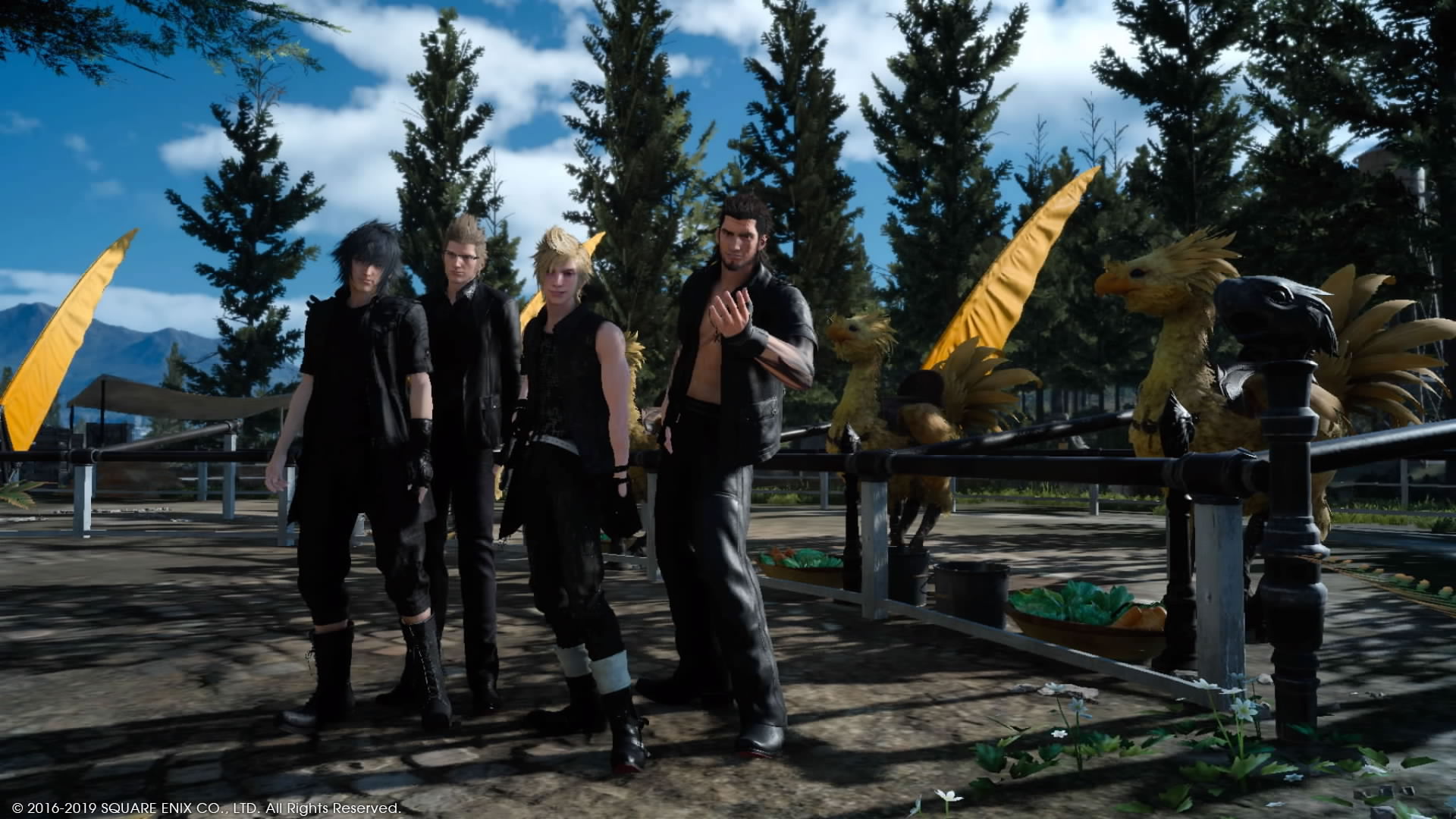Please Note: This piece contains major spoilers for Final Fantasy XV. I believe we’re okay for the most part, since the game came out almost three years ago. However, this is a public service announcement for readers who may not have completed the game yet and don’t want anything spoiled.
At around hour 30 during a routine overnight stop at an outpost on Eos, Prompto–my wise-cracking, fun-loving ranger–revealed a bunch of his insecurities. He revealed his frustrations with himself and his inadequacies, especially when compared to Gladio’s strength and Ignis’s intelligence. It was a tender moment within Final Fantasy XV, and one that I had expected to happen at some point. For better or worse, at its root, this is a game about building and fostering male relationships.
Final Fantasy XV is no stranger to the discussion around gender dynamics. Even before the release, game director Hajima Tabata tried to justify the all-male cast, saying:
Speaking honestly, an all-male party feels almost more approachable for players. Even the presence of one female in the group will change their behavior, so that they’ll act differently. So to give the most natural feeling, to make them feel sincere and honest, having them all the same gender made sense in that way.
This statement is problematic for a couple of reasons. First, there’s the implication that the noun “players” refers to “male players” by default. Also, it’s unclear whether Tabata is implying that players–male or female–would change how they engage with the game depending on the gender of the characters, or if it’s the characters themselves who would react differently. Both of these readings are bullshit, of course. As players, most of us are smart enough to play a game how we want, regardless of the gender of characters. And if you’re worried about how fictional characters would react to a situation, the answer is simple: they’re fictional; you can write them differently.
 Unfortunately, after the game was released, the gender dynamics became even more troublesome. The primary female lead, Lunafreya, seemed only to serve the purpose of strengthening and inspiring the main character, Noctis. She was only on screen for 10-20 minutes, a good portion of which involved her death at the hand of the big baddie. Cindy, while an extremely capable mechanic, was clearly physically designed with the male gaze in mind. And Gentiana, who does have an important role in the story, is motivated primarily by her relationship with a former lover. On the whole, Final Fantasy XV is a far cry from Final Fantasy XIII, which, for all its faults, gave us interesting gender dynamics as well as the main character Lightning–who is easily as cold and distant as Cloud Strife or Squall Leonhart before her.
Unfortunately, after the game was released, the gender dynamics became even more troublesome. The primary female lead, Lunafreya, seemed only to serve the purpose of strengthening and inspiring the main character, Noctis. She was only on screen for 10-20 minutes, a good portion of which involved her death at the hand of the big baddie. Cindy, while an extremely capable mechanic, was clearly physically designed with the male gaze in mind. And Gentiana, who does have an important role in the story, is motivated primarily by her relationship with a former lover. On the whole, Final Fantasy XV is a far cry from Final Fantasy XIII, which, for all its faults, gave us interesting gender dynamics as well as the main character Lightning–who is easily as cold and distant as Cloud Strife or Squall Leonhart before her.
Ultimately, there’s not much more to say about how FFXV treats its female characters. It just handles things badly from beginning to end. There’s no denying this, and I don’t intend to litigate these points at all. However, when considering gender dynamics within FFXV, I don’t believe it’s all bad. In fact, in looking at how the game handles the aforementioned male relationships, I believe it does quite a bit to tackle and address toxic masculinity.

The male characters in FFXV develop extremely deep relationships with each other that move beyond casual friendship to genuine love. The characters share deeply personal information with each other, they cry in front of each other, and they encourage each other to be the best humans they can be. And this is all done without any hint of judgement by the other characters. No one feels the need to qualify his feelings in any way, or ensure that the other characters (and audience, for that matter) know he is not gay. There’s no gruff utterances to cover sobs, or characters pretending they have dirt in their eyes. As far as these four men are concerned, expressing this emotion to each other is not just acceptable, it’s normal and expected. The final campfire scene, in which Noctis explains to the other three how much they mean to him is genuinely moving, and it feels worlds apart from characters like Cloud and Squall, whose cold, quiet nature supposedly shows they are badass. There are a lot of problems with the writing in FFXV, but using the relationships between the four main characters to dismantle problematic masculine tropes within the series is definitely not one of them.

Now, it’s important to note that this doesn’t undo the issues regarding Tabata’s statements or the game’s treatment of its female characters. You could have easily told the exact same story with a female character in the party. In fact, if your goal was to counter troublesome tropes in storytelling–as Tabata has also said–then you can only make your point stronger by including a female character by the campfire to engage with the male characters not as a romantic interest, but a true comrade in arms.
In the grand scheme of things, FFXV‘s attempts to redefine some of those masculine tropes is a drop in the bucket, but I do think it’s important to point out. As someone who was a young male teenager playing Final Fantasy VII, I can’t help but feel like some of my problematic views on how to act were defined by characters like Cloud Strife, whom I saw as cool. I’m sure more went into defining those views, which I have spent decades working to undo, but I’m also pretty sure that Cloud didn’t help. If FFVII had treated its male characters in a way similar to FFXV, maybe it would have given me a different perspective.
Or, at the very least, maybe I would have spent my teenage years admiring characters that showed more emotion than a bag of potatoes. And, I think that’s a good thing.




One thought on “[OPINION] DESPITE ITS FLAWS, ‘FINAL FANTASY XV’ TREATS MALE RELATIONSHIPS RIGHT”